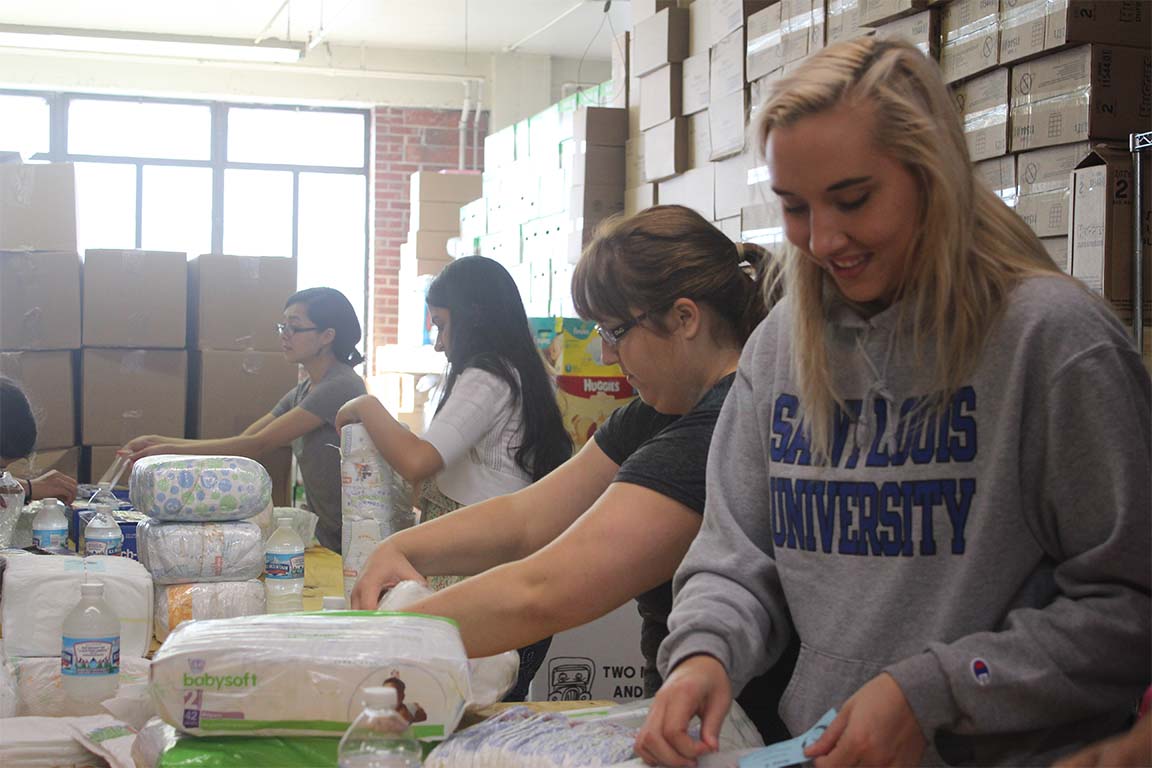Translating Knowledge into Action: SLU Focuses on Health of Women and Children
Saint Louis University’s College for Public Health and Social Justice is leading a campus-wide initiative to attack problems in the region that undermine the health of children and mothers.
Through SLU’s new social justice enterprise, Research and Equity in Action for Children’s Health (REACH), faculty and students who are eager to apply what they’ve learned through research and in the classroom will collaborate with community organizations that are equally committed to making meaningful change in the world.
An interdisciplinary faculty team is launching the initiative, with strong support from Collins Airhihenbuwa, Ph.D., dean of SLU’s College for Public Health and Social Justice.
SLU’s mission calls us to go beyond training people and granting a degree. We must make a difference in our community by applying what we are teaching."
Collins Airhihenbuwa, Ph.D., College for Public Health and Social Justice dean
“Infant mortality rates in St. Louis rival those in low resource countries, children are going to bed hungry at night and our city has the highest rates of sexually transmitted infections in the nation. Many groups already are tackling these issues and other problems to make our community healthier. But for us to have an impact, there must be a coordinated effort. SLU’s goal is to work side by side, with a collective voice that responds to the needs of women and children,” Airhihenbuwa said.
“SLU’s mission calls us to go beyond training people and granting a degree. We must make a difference in our community by applying what we are teaching. Together with community organizations, we are seeking funding for projects to improve maternal child health locally, expanding faculty engagement and increasing experiential learning opportunities for students.”
Through REACH, SLU will serve as the academic hub for groups working to improve the health of women and children in the region. REACH will support coordinated research into solutions for maternal child health issues by seeking funds to support faculty seed grants, establishing writing groups for manuscript and research proposals and connecting interested students with faculty members. Faculty and students also will be encouraged to engage directly with community groups through practicums, internships, volunteer opportunities, and education and training exercises.
“SLU is poised to serve as the academic backbone for community partnerships that advance maternal and child health, amplifying the terrific work of organizations in the St. Louis community,” said Nancy Weaver, Ph.D., REACH operations director and associate professor of behavioral science and health education at Saint Louis University’s College for Public Health and Social Justice.
“We have enormous expertise across many disciplines, and believe that true advancement in this critical area will come from a combination of research, practice and equity as we build relationships with organizations and individuals guided by a shared vision.”
Community Engagement: Through REACH, faculty and students will become resources for established community organizations that are experienced in addressing problems that impact the health of women and children. Guided by what the groups see as the most pressing needs for women and children in the region, faculty and students will support and strengthen their efforts. They also will help groups collaborate more closely so they can quickly respond to opportunities for funding, research, practice and training.
Data and Analysis: SLU will establish a repository of national and local maternal and child health survey results and administrative data to better inform decisions by community groups. SLU will consult, provide statistic training and evaluation services to affiliated organizations, helping them interpret data with a focus on how it impacts women and children. SLU also will collect data to identify learning opportunities for students, note active grant proposals and showcase collaborative publications.
Workforce Development: SLU will identify community needs, provide training that addresses the unique challenges of working in maternal-child health, and strive to increase the diversity of professionals in the field. It will coordinate and lead training opportunities for SLU students and those affiliated with maternal and child health organizations to strengthen the skills of future and current leaders who are on the front line of solving complicated problems that undermine health.
The first University-wide meeting to discuss the initiative is from noon to 1 p.m. Thursday, Feb. 9, in the Salus Center auditorium. Faculty are asked to complete this survey, sharing their research area and level of interest in becoming involved in REACH.
To learn more about REACH, email reach@slu.edu.
The Saint Louis University College for Public Health and Social Justice is the only
academic unit of its kind, studying social, environmental and physical influences
that together determine the health and well-being of people and communities. It also
is the only accredited school or college of public health among nearly 250 Catholic
institutions of higher education in the United States.
Guided by a mission of social justice and focus on finding innovative and collaborative
solutions for complex health problems, the College offers nationally recognized programs
in public health, social work, health administration, applied behavior analysis, and
criminology and criminal justice.
REACH (Research and Equity in Action for Child Health) was launched by an interdisciplinary group of Saint Louis University faculty with support from the dean of SLU’s College for Public Health and Social Justice. REACH serves as an academic backbone for community partnerships that advance maternal and child health, with particular attention to highly vulnerable families and social factors that affect health.


















